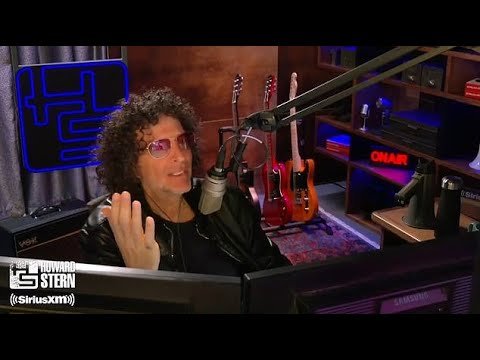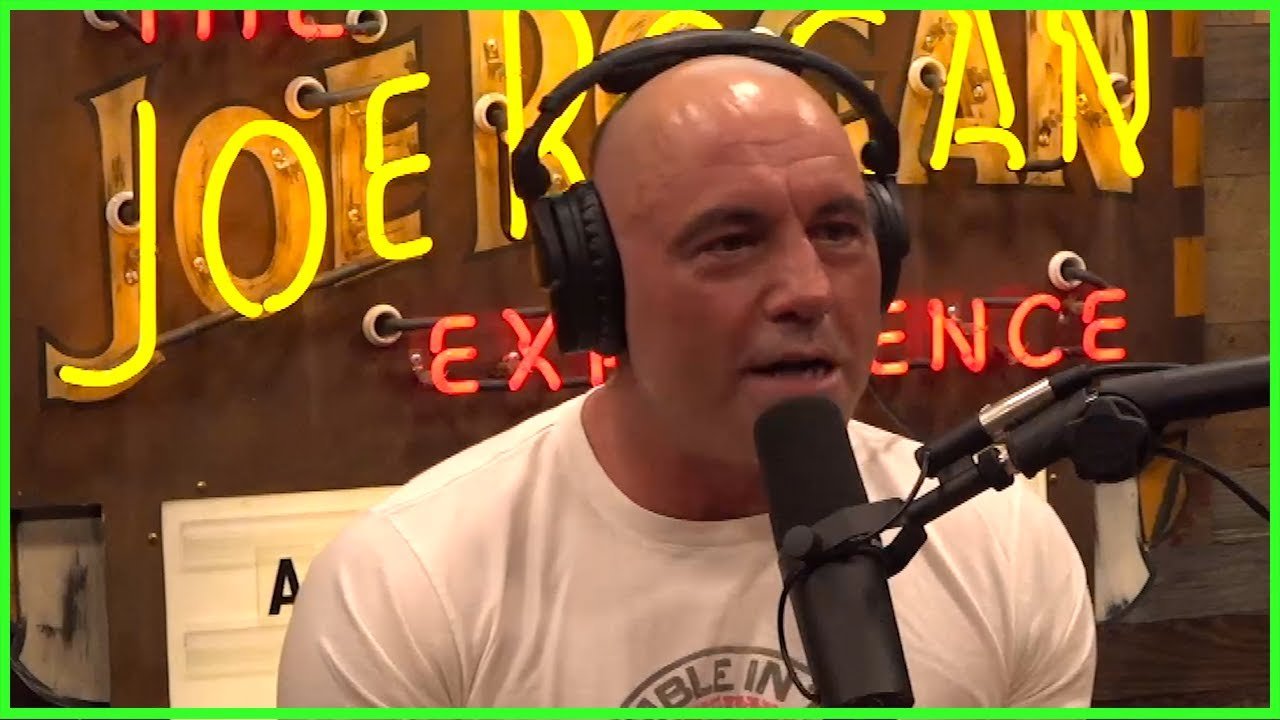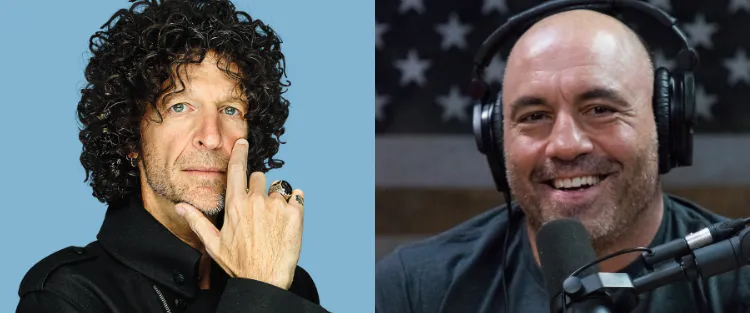The Past Meets The Present
The evolution of media over the past few decades reflects significant technological advancements, shifting audience preferences, and a broader cultural transformation. Traditional media formats, primarily radio and print, have seen a remarkable transition into digital platforms that offer diversified content and instant accessibility. This evolution has not only influenced how audiences consume information but has also significantly altered the way that media figures establish their presence and influence. The advent of the internet brought forth a paradigm shift in content creation and distribution, giving rise to mediums such as podcasts, which have revolutionized the industry.
Who’s Your Pick…Joe Rogan or Howard Stern?
Historically, radio served as a primary source of entertainment and news, with iconic personalities like Howard Stern epitomizing the medium’s influence during its peak. Stern’s approach to talk radio established a unique blend of candid commentary and entertainment, captivating audiences for decades. His ability to dominate the airwaves showcased the power of personality-driven media within a traditionally structured format. However, as the digital age advanced, the limitations of conventional broadcasting became apparent. Audiences began to seek more personalized and on-demand content, leading to the rise of platforms that facilitated this shift. Stern made it clear he did not respect podcast hosts or the idea of podcasts and he has been proven to be wrong…badly wrong.
Today, Joe Rogan represents a new era in which the accessibility of podcasting has democratized content creation, allowing for a diverse array of voices and perspectives to emerge. Unlike the restrictive formats of traditional radio, podcasts provide the freedom to explore topics in depth, fostering longer, more nuanced conversations. Rogan’s success is emblematic of this change, as he harnesses the power of the internet to reach millions globally, influencing public discourse in unprecedented ways.
Understanding this evolution is critical not only for media professionals but also for audiences navigating the ever-changing landscape of information consumption. As we delve deeper into the contributions of Howard Stern and Joe Rogan, we uncover the distinctive characteristics that define their impact within their respective eras, highlighting both the continuity and transformation of media as a vital force in society. Even so, Rogan seems to be the future and Stern is a relic of the past as Sirius has let him know recently.
Howard Stern: The Former King of All Media
Howard Stern, often referred to as the “King of All Media,” has had a profound impact on the landscape of radio and entertainment since he first entered the industry in the 1970s. Initially recognized as a shock jock for his provocative and controversial humor, Stern quickly differentiated himself from others in the broadcasting world. His willingness to address taboo topics and his unfiltered opinion on various subjects resonated deeply with audiences, enabling him to build a substantial following that would endure for decades.
In 2006, Stern made a landmark transition from traditional terrestrial radio to satellite radio by signing an exclusive deal with SiriusXM. This shift not only expanded his platform but also revolutionized how content could be delivered. With the absence of advertising constraints typical in conventional radio formats, Stern was able to unleash his creativity and connect with his audience on a more intimate level. The move to SiriusXM significantly broadened his reach, introducing him to millions of new listeners who craved a different style of entertainment devoid of the traditional limitations of radio.
Stern’s approach to content creation has been unique; he focuses on authenticity and vulnerability, inviting guests from various backgrounds to share their stories openly. This method has garnered him numerous accolades, including multiple Marconi Awards and induction into the Radio Hall of Fame. His influence has set a benchmark for future radio hosts and content creators, shaping the expectations of listeners in terms of what they expect from on-air personalities.
By embracing both the evolving media landscape and his audience’s desires, Howard Stern has not only solidified his legacy but has also paved the way for future media stars to emerge, further defining the essence of modern broadcasting. But… over the last 10-15 years at least Howard has become soft and sold out his bad boy image to become a strange, woke version of what he was who is ashamed of his past content that made him the celebrity he is. Stern was always a phony who wanted to be full Hollywood and he eventually got there.

Joe Rogan: The New Media Monarch
Joe Rogan has emerged as a significant figure in the landscape of contemporary media, marking a generational shift in how information is disseminated to the public. Initially, Rogan made his name as a stand-up comedian and an actor, best known for his role in the television series “NewsRadio.” However, his transition to podcasting has redefined his career and established him as a media monarch of the digital age. His podcast, “The Joe Rogan Experience,” which began in 2009, has grown into one of the most influential platforms on the internet, appealing especially to younger audiences.
Rogan’s unique format—featuring long, unscripted conversations with a diverse array of guests—has played a vital role in his immense popularity. Unlike traditional media outlets that typically adhere to rigid guidelines, Rogan’s approach fosters in-depth discussions and encourages a wide array of viewpoints. His combination of humor, curiosity, and authenticity resonates with listeners, allowing them to feel a personal connection with both Rogan and his guests. This distinct podcasting style has not only garnered millions of listeners but has also contributed to the reshaping of the industry, positioning podcasting as a credible alternative to mainstream media.
However, Rogan’s ascent has not been without controversy. His platform has come under scrutiny for allegedly facilitating the spread of misinformation, particularly regarding health-related topics and political discussions. Critics argue that his influence complicates the media landscape, where discerning fact from fiction can be challenging. Despite this, Rogan’s impact on modern media is undeniable; he represents the evolving relationship between audiences and content creators in a digital world driven by user interaction and engagement.
Rogan’s strength is he is very open minded and has a vast variety of guests on talking about everything from sports to UFO’s where Howard has old, boring celebrities like Bruce Springsteen that still think he is an avenue to fans. Plus Rogan is by far the better interviewer in my opinion.

Comparative Analysis and Public Rivalry
The media landscape has been profoundly shaped by influential figures such as Howard Stern and Joe Rogan, each representing distinct eras and methodologies in content delivery. Stern, often referred to as the “King of All Media,” rose to prominence in the era of terrestrial radio, establishing a legacy marked by shock value, celebrity interviews, and a bounded format constrained by advertising and FCC regulations. His unique approach to radio entertainment garnered a loyal audience, transforming how listeners engaged with audio content. Conversely, Joe Rogan epitomizes the dynamic shift toward digital platforms, spearheading a movement characterized by long-form discussions delivered through podcasts. Rogan’s model, which thrives on unfiltered conversations and the democratization of voice, appeals to a diverse demographic, particularly younger audiences seeking authenticity and spontaneity.
In examining the public rivalry between these two media icons, it is essential to recognize the underlying tensions that shape their relationship. Stern has not shied away from voicing his criticisms of Rogan’s podcasting approach, suggesting that the unregulated and often freewheeling style of conversation could compromise the integrity of media storytelling. These remarks serve as a reflection of Stern’s traditional values, which prioritize structured discourse and polished content. On the other hand, Rogan’s platform promotes a more casual, unscripted exchange of ideas, resonating with audiences who favor accessibility and relatability over formality.
The implications of this rivalry extend beyond personal critiques; they encapsulate a broader generational conflict in the media sphere. As traditional media institutions face challenges from newer platforms, figures like Rogan exemplify the shift towards a more decentralized, diverse, and democratized form of content consumption. This evolution represents a departure from the norms established by Stern and his contemporaries, signifying not only a change in style but also a fundamental transformation in how media is created, consumed, and defined in modern society. As such, the rivalry between Stern and Rogan illuminates the ongoing discourse surrounding the future of media amidst an ever-changing digital landscape.
